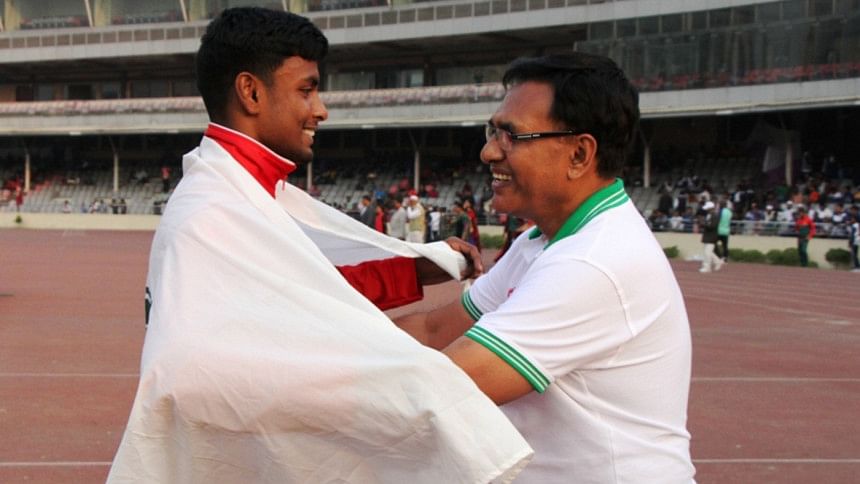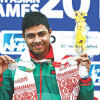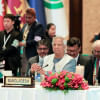‘If nothing changes, athletics will fall apart’

Milzar Hossain, one of the most prominent athletes of the country in the 80s, holds the record for the best ever timing by a Bangladeshi in the 800m event, 1:51.16, which he clocked in the 1986 Asian Games to finish fifth. The 58-year-old SA Games silver medalist spoke with The Daily Star's Anisur Rahman about the current state of athletics in Bangladesh and what needs to be done to improve it. The excerpts of the conversation are given below.
The Daily Star (DS): How do you view the current state of the country's athletics as a former athlete?
Milzar Hossain (MH): The country's athletics is not in a good position. We keep hyping up Imranur [Rahman], but his performance is going to downhill. There is another athlete named Zahir [Rayhan], who won a silver medal in the Asian Indoor Championship, but with his timing [48.10 seconds], he won't even win a medal in the South Asian Games or make it to the semifinal of the Asian Games. Some 37-38 years ago, I clocked 47.55 seconds in the Asian Games to qualify for the semifinal but could not qualify for the final. Apart from Imranur and Zahir, I only see two more promising athletes - Zakia Akhter in the shot put and Ritu Akhter in the high jump. Except for these four, I see no hope for anyone else.
DS: Why do you think athletics is in such a poor state?
MH: Those who are in power have a lot of work to do, I think. When we started out in athletics, the athletes, the coaches and the training were of a certain standard. We trained under coaches from England, Russia and China for brief periods, which helped us improve. There is no alternative to training. If you want to achieve something, you have to provide good training, accommodation, food and other facilities. In my view, we lack proper training and lack of responsible individuals in positions of power.
DS: Many government wings like BJMC, BTMC and Customs are no longer active in athletics. Do you think their absence is hurting athletics?
MH: Of course, the absence of those organisations is another big reason. Earlier, BJMC, BTMC, Customs, Bangladesh Railway, T&T and other government offices took part in sports. As a service-holder, I can tell you specifically about BJMC. It had four zones – Dhaka, Khulna, Chattogram and Adamjee. There were 15 to 16 jute mills in Khulna zone and sports organisers tried to find new talent from different villages, schools and colleges. They provided allocations for athletes if they finished among the top six in the zonal competition of BJMC. I was also a product of such initiatives. Textiles also hunted talented athletes like BJMC but at present, there are no such initiatives from any government organisations across the country, so the talented athletes remain unearthed across the country.
DS: Defense organisations like the Army, Navy, Air Force and Ansar & VDP are currently dominating athletics. What is the difference between such organisations and teams like BJMC and BTMC?
HM: They can't unearth the really talented athletes because of their limitations. They can look for athletes only among their recruited soldiers during the intra-sports programme. But when the talent is found, they are already of age and don't have time to improve themselves. They may succeed at the national level but they can't succeed at the international level. They also rope in a limited number of athletes from the national youth championships but those athletes lack the quality. However, BJMC and BTMC had no limitations in appointing apprentice athletes under minimum facilities.
DS: Khulna region, where you are from, doesn't produce as many athletes as it used to. Why?
MH: BJMC and BTMC produced a lot of athletes from Khulna, Jashore, Kushtia and Rajshahi. It stopped after BJMC and BTMC shut down their programmes.
DS: Why are the current generation of athletes failing to live up to the standards set by the likes of you, Shah Alam, Bimal Chandra and Mahbub Alam?
MH: Firstly, you have to search for talents across the country and provide them with proper training and facilities, that was the case for us. Then, you will find the successors of Shah Alam, Mahbub Alam and Biman Chandra. In the process, another important thing is to support the athletes financially, otherwise, they won't show interest. For example, most of us got government jobs in places like the BJMC, BTMC, Police and T&T after performing well, which doesn't happen now.
DS: Do you think a lack of proper leadership caused this vacuum in athletics?
MH: I think the organisers need to be competent. Before becoming an organiser, one must have a team and develop the capacity to organize. There is a shortage of such competent organisers. In the past, every District Sports Association (DSA) held its annual sports event regularly with the participation of affiliated clubs and participated in national championships. But there are no such annual sports in most of DSAs anymore. So, the local athletes are not getting a platform to climb up the ladder. Nowadays DSAs take part in the national championship just to save their councillorship.
DS: How do you think athletics can return to its glory days?
MH: Government organisations, corporate houses and clubs need to recruit athletes, offer them good contracts and then take part in the national championships. Only then the country's sports can be revived. If it continues to be run the way it is right now, the country's athletics will fall apart.

 For all latest news, follow The Daily Star's Google News channel.
For all latest news, follow The Daily Star's Google News channel. 








Comments